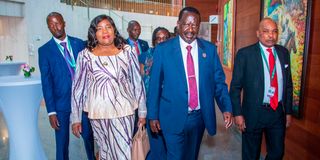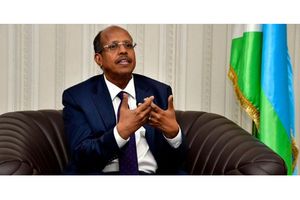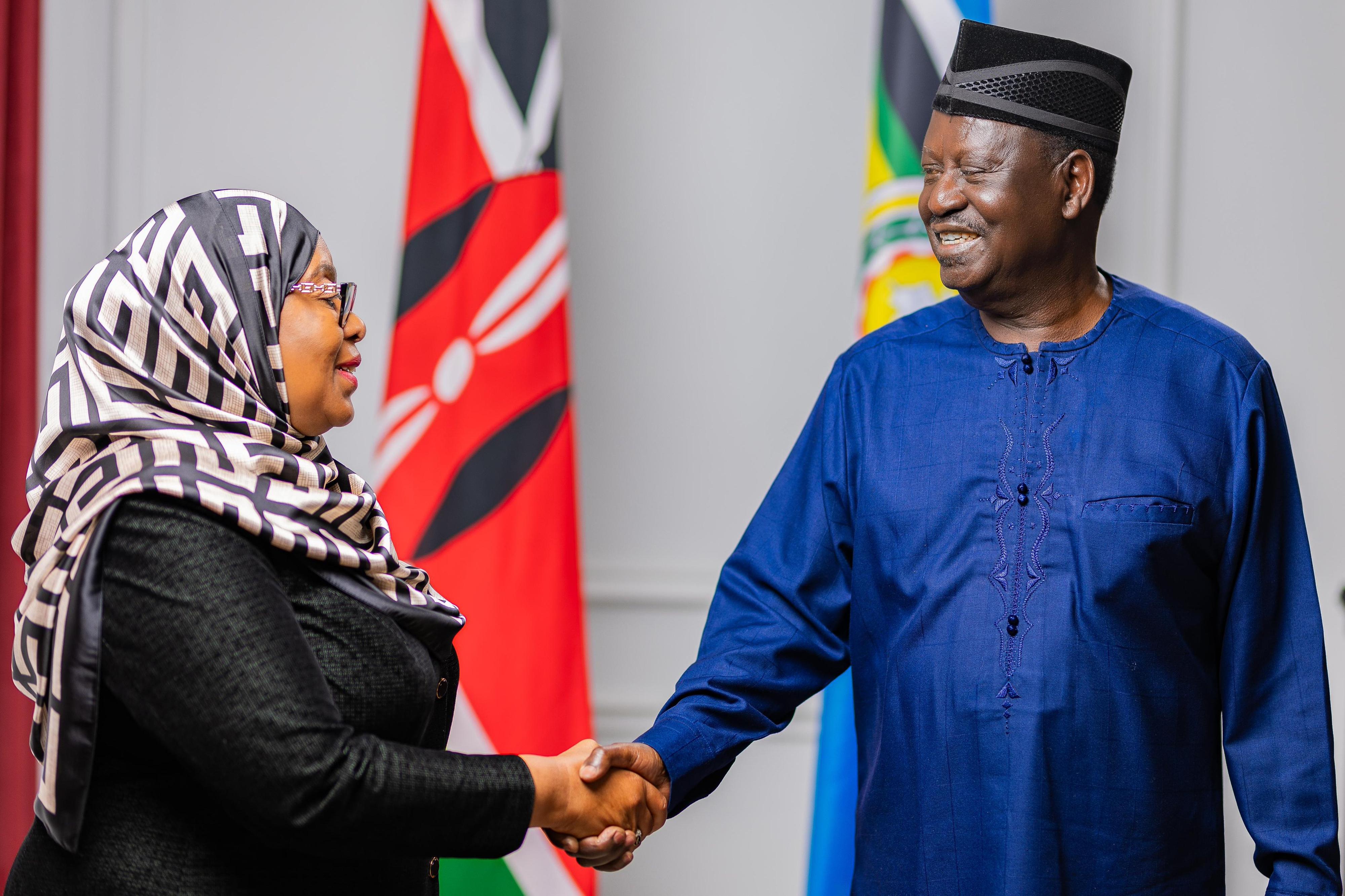
Raila Odinga with his family and Makau Mutua at AUC Headquarters shortly after the election.
In Addis Ababa, Ethiopia
Kenya’s bid for the African Union Commission (AUC) Chairmanship suffered a major blow Saturday, February 15 as regional disunity, a united Francophone bloc, and a last-minute Southern African Development Community (SADC) solidarity move sealed former Prime Minister Raila Odinga’s fate.
Despite Mr Odinga and Kenya’s early momentum, age factor, shifting alliances and entrenched bloc politics ensured Djibouti’s Mahamoud Ali Youssouf clinched the seat after garnering the requisite two-thirds (33 votes from member states) in the seventh round of voting.
Mr Odinga started the race on the right footing, winning in both the first and second rounds of the vote before the Djibouti candidate turned the scales from the third round.
Mr Odinga got 20 votes, Mr Youssouf 18, while former Madagascar Foreign Minister Richard James Randriamandrato, 66, secured 10 votes in the first round.
In the second round, Mr Odinga again won after garnering 22 votes, Mr Youssouf got 19, Mr Randriamandrato 7 while there was 1 abstention.
Mr Youssouf would then overtake Mr Odinga in the third round and maintained a rather slim lead until the fifth and sixth rounds when he opened a gap.
Mr Randriamandrato was dropped from the race after the third round.
Shifting allegiances
As ballots were cast during the 38th Ordinary Session of the Assembly of the Heads of State and Government in Addis Ababa, Ethiopia, shifting allegiances unravelled Kenya’s hopes, clearing the way for Mr Youssouf.
There were earlier signs that President William Ruto was facing a delicate task as chairperson of the EAC in the Democratic Republic of Congo (DRC) peace talks after experts warned that his decisions on the crisis could affect Mr Odinga’s bid.
The current DR Congo crisis was indeed an acid test for President Ruto as it created geopolitical tensions between the EAC and the SADC. The two blocs last week agreed to a joint bid to resolve the conflict after separate processes.
A disunited EAC, where countries like DRC and Somalia had earlier shown signs they would not vote for Nairobi, also played a key role.
Foreign Affairs Principal Secretary Korir Sing’oei had in an earlier interview with Nation confirmed that Mogadishu had indicated it would not vote for Nairobi in favour of the Djiboutian candidate.
When President Ruto first convened an EAC meeting on the DRC crisis, Congolese President Felix Tshisekedi snubbed it and went ahead to attend a separate meeting convened by SADC.
The snubbing of Dr Ruto's meeting lends credence to the belief among Congolese that Kenya - and President Ruto – supports Rwanda’s President Paul Kagame in the diplomatic falling-out.
Former Kenya’s ambassador to Korea Ngovi Kitau said the failure to manage the Congo crisis and the perception that Kenya was not a neutral arbiter played to Mr Odinga’s disadvantage.
“Look at the DRC case. Again we have failed to manage it through the Nairobi process and as chair of EAC. SADC had to intervene. SADC has 16 votes and if they didn’t vote for us, as they abstained in 2017, we were doomed,” the former envoy told Nation.
That SADC bloc move, which came just 48 hours before the elections, became the last nail in Mr Odinga’s AUC bid coffin.
In a letter, SADC Secretariat’s Executive Secretary Elias M. Magosi encouraged the 16 nations of the bloc to vote for Mr Randriamandrato.
But it was the fear of where those votes would go in late rounds that really bit Mr Odinga’s campaign team—and it showed in the final tally.
16 nations
Even though the 16 nations failed to vote for Mr Randriamandrato after he secured only 10 and 7 votes respectively in the first and second round, Mr Youssouf tilted the scale against Mr Odinga in the third round after the former Madagascar Foreign Minister dropped out.
Mr Youssouf appeared to have benefitted from the SADC votes in the subsequent rounds of voting leading to his victory.
But sources on Saturday also intimated to Nation that “a last-minute diplomatic goof,” by Kenya could also have contributed to Mr Odinga’s loss.
Dr Sing’oei, the Foreign Affairs PS had on Friday, less than 24 hours to the poll made a terse statement against SADC and Madagascar, that sources indicated could not have gone down well with the bloc and Antananarivo.
The PS called for reforms within the African Union to iron out certain challenges such as Madagascar representing the Eastern and Southern regions.
"This is the turn of a member of the Eastern region to be elected. Madagascar straddles both the Eastern and Southern regions," Dr Sing’oei charged.
He went on: “From a technical standpoint, Madagascar should not be on the ballot in regards to the Eastern region because if it was the turn of the Southern region, they could still contest."
The PS went ahead to hit out at the SADC Secretariat’s Executive Secretary, saying: “If you look at the letter, it's written by the SADC Secretary General, a bureaucrat. The letter is dated February 12, barely five days before the elections.”
Apart from the SADC bloc factor, the Francophone countries’ influence also played out in the Saturday election. In the past, French-speaking countries largely voted for their own.
While there were two French-speaking candidates, the support for Mr Youssouf, an experienced Foreign minister, was visible after Madagascar's Mr Randriamandrato dropped from the race.
International Relations and Diplomacy professor Gilbert Khadiagala told Nation that Kenya was poised for a tough battle since it ran against a “combined force of “Francophone and Muslim interests and states that dominate the continental scene.”
“The South African candidate (Dr Dlamini Zuma) won a few years ago because SA (South Africa) campaigned vigorously for her and Jean Ping, the Gabonese candidate was weak. If Kenya wants to win next time, it will need a young and energetic candidate who speaks French and can appeal to the wider Africa,” said Prof Khadiagala of the University of the Witwatersrand in South Africa.
He went on: “Raila did better than expected, but not enough to triumph; he was not Kenya's strongest candidate in all respects. The country should do better next time.”
Kenya's foreign policy some of which are said to be at odds with the continental body, has also been attributed to the AUC loss.
“The issue of Sahrawi is of great concern. Kenya had mulled closing their embassy in Nairobi on Morocco lobbying. They changed their mind but have strengthened ties with Morocco while waiting out Sahrawi Arab Democratic Republic (SADR),” a source aware of the intrigues but fearful of the backlash intimated to Nation anonymously.
Deployed troops
The source added: “On the issue of Palestine, Kenya supported the transfer of Israel's capital from Tel Aviv to Jerusalem, a city contested by both Palestine and Israel. Kenya supported the admission of Israel as an observer state to the AU. Israel's status is still pending because Algeria and South Africa refused it. On the Haiti mission, Kenya is also said to have deployed its troops without AU endorsement.”
Mr Kitau, former Kenya’s ambassador to Korea, added that religious issues also played out in the Saturday polls.
“The religious issue is also very important, cutting across North Africa, West Africa, and Central Africa,” he said.
Speaking after the election process, Mr Odinga conceded defeat and congratulated Mr Youssouf for his victory.
“Over the last few months I've been running around the continent canvassing for their votes, and today they have expressed themselves and we did not succeed. We must strengthen democracy in Africa and I concede defeat. I wish my competitor Mahamoud Ali Youssouf all the best. I wish him success in his undertaking. I thank those who voted for me and those who did not because they exercised their democratic rights,” Mr Odinga told journalists at the AU Headquarters, flanked by Prime Cabinet Secretary Musalia Mudavadi.
They were later joined by President Ruto, who, however, refused to comment.
“While the outcome of this election did not favour Kenya’s candidate, I wish to convey my deepest gratitude to the entire leadership of our great continent. Thank you for considering Raila Odinga’s vision and priorities for the African Union and for giving him the opportunity to share his passion for the continent’s transformation. . . This election was not about individuals or nations; it was about Africa’s future. That future remains bright and, together, we will continue working for a united, prosperous, and influential Africa on the global stage,” President Ruto said on his social media and congratulated the winning candidates.
Best candidate
Deputy President Kithure Kindiki said: “President William Ruto, our candidate Raila Odinga, and his campaign team gave their best. Unfortunately, we have lost. We remain a proud nation that we came so close. Today was not our day, our day will come. Thanks to all the friends of Kenya who stood with us when it mattered.”
Prof Kindiki heaped praise on President Ruto and Mr Odinga for a determined race for the African Union Commission chairmanship.
The Deputy President said the two leaders gave their best even though Raila’s bid was unsuccessful during voting in Addis Ababa on Saturday.
Prof Kindiki said Kenya fronted the best candidate and remained proud despite the loss to Djibouti’s Mahmoud Youssouf.
“We remain a proud nation that we came so close. Today was not our day, our day will come. Thanks to all the friends of Kenya who stood with us when it mattered,” the DP said.
He affirmed that Kenya’s bid was strong and the country had never before fronted such a qualified, decorated, and ideologically anchored candidate for an international job.
Despite the loss, Prof Kindiki said it is time to reflect and learn from Saturday’s outcome for better quests in the future.
“Our loss despite such a superior candidate with a clear agenda for the continent and after such an energetic campaign requires that we figure out what else to get right in future bids,” he added.
In the elections, Algeria’s former ambassador to Kenya Selma Malika was elected the AUC Deputy chairperson.
In the AUC poll, the winners had to secure a two-thirds majority from 49 eligible Member States.
At least six countries are under sanctions and did not participate in the elections. The six are Gabon, Niger, Guinea, Sudan, Burkina Faso, and Mali.
Dr Abiy Ahmed, Prime Minister of Ethiopia, is hosting the Summit.
Outgoing AUC Chairperson Moussa Faki, in his statement, lauded President Ruto (the new champion of AU reforms) and his predecessor, Rwanda’s Paul Kagame, for championing reforms in the continental body.
United Nations Secretary-General António Guterres has called for peaceful processes to end regional conflicts.
"The crisis in the DRC must end and we must embrace peaceful processes to end conflicts through meaningful dialogue," he said of the ongoing crisis in the Democratic Republic of Congo.


